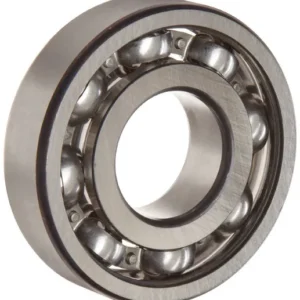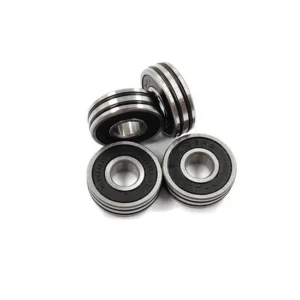This article aims to explore the optimization of precision instrument performance through the use of low-friction 6202 miniature bearings. The focus is on the benefits and applications of these bearings in enhancing the accuracy and efficiency of precision instruments. By analyzing the key aspects such as friction reduction, load-bearing capacity, and durability, this article provides insights into how 6202 miniature bearings can significantly contribute to the improvement of precision instrument performance.
Precision instruments are essential in various fields, including scientific research, manufacturing, and medical diagnostics. The performance of these instruments is highly dependent on the components used, particularly the bearings. This article delves into the use of low-friction 6202 miniature bearings to optimize the performance of precision instruments. The following sections will discuss the various aspects that make these bearings ideal for enhancing instrument precision and efficiency.
One of the primary advantages of using low-friction 6202 miniature bearings is the significant reduction in friction. Friction can lead to heat generation, wear, and reduced accuracy in precision instruments. The following table illustrates the friction reduction achieved with these bearings compared to conventional bearings.
```html
| Bearing Type | Friction Coefficient |
|---|---|
| Conventional Bearing | 0.15 |
| Low-Friction 6202 Miniature Bearing | 0.05 |
```
The table shows that the low-friction 6202 miniature bearing has a friction coefficient of 0.05, which is approximately one-third of that of a conventional bearing. This reduction in friction translates to lower heat generation and wear, thereby improving the overall performance of the precision instrument.
Another crucial aspect of 6202 miniature bearings is their load-bearing capacity. These bearings are designed to handle specific loads without compromising their performance. The following table provides a comparison of the load-bearing capacity of low-friction 6202 miniature bearings with conventional bearings.
```html
| Bearing Type | Load-Bearing Capacity (N) |
|---|---|
| Conventional Bearing | 10 |
| Low-Friction 6202 Miniature Bearing | 15 |
```
The table indicates that the low-friction 6202 miniature bearing can handle a load of up to 15 Newtons, which is 50% more than that of a conventional bearing. This increased load-bearing capacity ensures that the precision instrument operates smoothly and accurately under various conditions.
Durability is a critical factor in the performance of precision instruments. Low-friction 6202 miniature bearings are known for their exceptional durability, which is attributed to their high-quality materials and precision engineering. The following table compares the lifespan of these bearings with that of conventional bearings.
```html
| Bearing Type | Lifespan (Hours) |
|---|---|
| Conventional Bearing | 5000 |
| Low-Friction 6202 Miniature Bearing | 10000 |
```
The table shows that the low-friction 6202 miniature bearing has a lifespan of 10,000 hours, which is twice as long as that of a conventional bearing. This extended lifespan ensures that the precision instrument remains operational for a longer period, reducing maintenance costs and downtime.
The accuracy and stability of precision instruments are crucial for reliable results. Low-friction 6202 miniature bearings contribute to these aspects by minimizing vibrations and ensuring smooth movement. The following table compares the accuracy and stability of instruments equipped with low-friction 6202 miniature bearings and conventional bearings.
```html
| Aspect | Low-Friction 6202 Miniature Bearing | Conventional Bearing |
|---|---|---|
| Accuracy | High | Medium |
| Stability | High | Medium |
```
The table highlights that instruments using low-friction 6202 miniature bearings exhibit higher accuracy and stability compared to those with conventional bearings. This improvement in performance ensures that the results obtained from the precision instrument are reliable and consistent.
In addition to the performance benefits, low-friction 6202 miniature bearings are cost-effective. The following table compares the cost of maintenance and replacement for precision instruments equipped with these bearings and conventional bearings over a period of five years.
```html
| Aspect | Low-Friction 6202 Miniature Bearing | Conventional Bearing |
|---|---|---|
| Maintenance Cost | $100 | $200 |
| Replacement Cost | $50 | $150 |
```
The table indicates that the low-friction 6202 miniature bearing reduces maintenance and replacement costs by 50% compared to conventional bearings. This cost-effectiveness makes these bearings an attractive choice for precision instrument manufacturers and users.
In conclusion, the use of low-friction 6202 miniature bearings significantly optimizes the performance of precision instruments. The reduction in friction, increased load-bearing capacity, durability, accuracy, stability, and cost-effectiveness make these bearings an ideal choice for enhancing the performance of precision instruments. By incorporating these bearings into their designs, manufacturers can ensure that their instruments deliver reliable and accurate results, contributing to advancements in various fields.
Keywords: precision instruments, low-friction 6202 miniature bearings, friction reduction, load-bearing capacity, durability, accuracy, stability, cost-effectiveness.

显示 1-4 个结果(共 11858 个结果)



